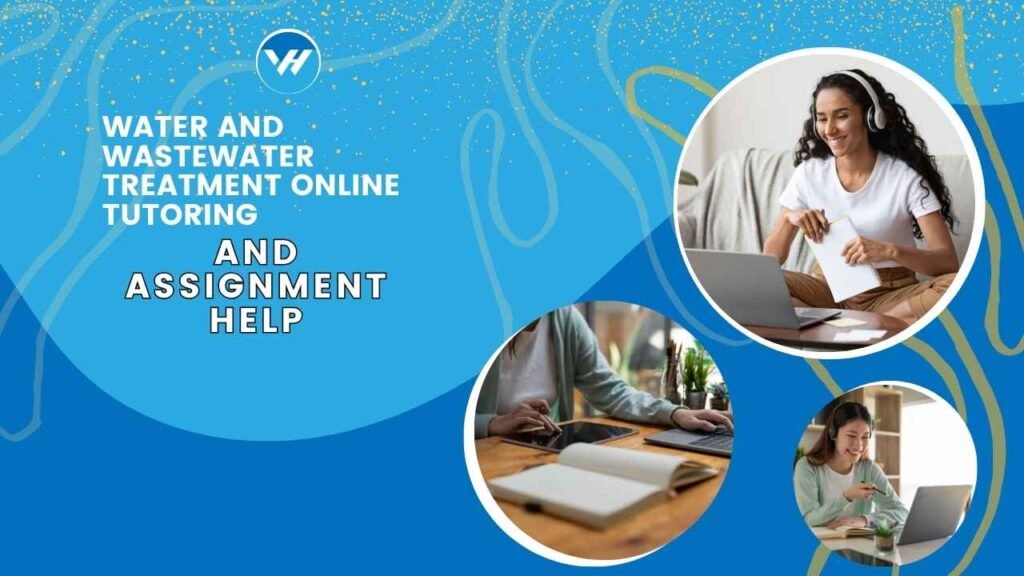Water and wastewater treatment is a crucial field that plays a vital role in ensuring the health and safety of communities by providing clean water and managing waste effectively. However, studying this subject can be challenging due to its complex technical concepts and the need for practical understanding. This is where online tutoring and assignment help can make a significant difference, offering students the guidance and support they need to excel in their studies.

Table of Contents
ToggleUnderstanding Water and Wastewater Treatment
What is Water Treatment?
Water treatment is the process of making water safe for human consumption and other uses. It involves removing contaminants and impurities from raw water to ensure it meets health standards. The process typically includes filtration, sedimentation, and disinfection, which are essential for providing clean and safe drinking water.
Water treatment is not just a technical necessity but a critical component of public health. Every time you drink a glass of water, you’re benefiting from the intricate processes that ensure that water is free from harmful substances.
What is Wastewater Treatment?
Wastewater treatment, on the other hand, focuses on cleaning used water before it is released back into the environment. This process is essential for preventing pollution and protecting ecosystems. Wastewater treatment involves several stages, including primary, secondary, and tertiary treatments, each designed to remove different types of contaminants.
Without effective wastewater treatment, our rivers, lakes, and oceans would be at risk of severe pollution, leading to catastrophic consequences for both humans and wildlife.
Key Concepts in Water and Wastewater Treatment
Physical Treatment Methods
One of the primary methods used in both water and wastewater treatment is physical treatment, which involves the removal of solid particles from water.
- Filtration: This is the process of passing water through filters to remove impurities. Filters can be made of various materials, including sand, gravel, and carbon, and are designed to capture particles based on size.
- Sedimentation: In this method, water is allowed to sit in large tanks, enabling heavy particles to settle at the bottom. This is often followed by a filtration process to remove the settled particles.
Chemical Treatment Methods
Chemical treatment methods are used to remove dissolved substances and kill harmful microorganisms.
- Chlorination: This is the most common disinfection method, where chlorine is added to water to kill bacteria and viruses. It’s a crucial step in ensuring that water is safe to drink.
- Coagulation and Flocculation: These processes involve adding chemicals to water that cause particles to clump together, making them easier to remove. This is often used in combination with physical treatment methods like filtration.
Biological Treatment Methods
Biological treatment is primarily used in wastewater treatment and involves using microorganisms to break down organic matter.
- Aerobic and Anaerobic Digestion: These are processes where bacteria decompose organic materials in the presence (aerobic) or absence (anaerobic) of oxygen. This helps in reducing the volume of waste and making the treated water safe for release into the environment.
- Role of Microorganisms: Microorganisms play a critical role in breaking down pollutants, converting them into less harmful substances that can be safely released or further treated.
Challenges Students Face in Water and Wastewater Treatment Studies
Complexity of the Subject
Water and wastewater treatment is a highly technical field, filled with complex concepts and processes that can be overwhelming for students.
- Technical Terminology: The subject is full of specialized terms that students must understand to grasp the underlying principles. This can make it difficult for those who are new to the field.
- Understanding Complex Processes: The processes involved in treatment are intricate and require a deep understanding of both theory and practice. Students often struggle to visualize how these processes work in real-life scenarios.
Lack of Practical Exposure
Many students find it challenging to fully comprehend the subject without hands-on experience.
- Importance of Hands-on Experience: Practical experience is essential for understanding how theoretical concepts apply in real-world situations. However, many students lack access to labs or fieldwork opportunities.
- Difficulty in Visualizing Processes: Without practical exposure, it can be hard for students to imagine how treatment processes work, making it difficult to fully understand the material.
Benefits of Online Tutoring for Water and Wastewater Treatment
Personalized Learning Experience
One of the significant advantages of online tutoring is the ability to receive personalized instruction tailored to your needs.
- Tailored Study Plans: Tutors can create custom study plans that focus on your specific areas of difficulty, ensuring that you get the most out of your learning experience.
- One-on-One Sessions: Online tutoring allows for one-on-one interaction with experts who can provide immediate feedback and answer your questions in real-time.
Access to Expert Tutors
With online tutoring, students have access to a wide range of expert tutors who are well-versed in water and wastewater treatment.
- Qualified Professionals: Tutors often have advanced degrees and practical experience in the field, making them well-equipped to teach complex concepts.
- Real-World Experience: Many tutors bring real-world experience to their sessions, providing students with insights that go beyond textbook knowledge.
Flexibility and Convenience
Online tutoring offers unparalleled flexibility, allowing you to learn at your own pace and on your schedule.
- Study Anytime, Anywhere: Whether you’re a full-time student or working a job, online tutoring allows you to fit your studies around your other commitments.
- Balancing Studies with Other Commitments: The flexibility of online tutoring makes it easier to balance your studies with work, family, or other responsibilities.
How Virtual Help Can Assist with Water and Wastewater Treatment
Comprehensive Tutoring Services
Virtual Help is an online platform that connects students with expert tutors across various subjects, including water and wastewater treatment.
- Access to a Wide Range of Tutors: With Virtual Help, you can choose from a wide range of tutors who specialize in different aspects of water and wastewater treatment, ensuring that you find the right fit for your needs.
- Specialized in Various Aspects of Treatment Processes: Tutors on Virtual Help are specialized in various aspects of treatment processes, from physical and chemical methods to biological treatments, offering comprehensive support.
Assignment Help Services
In addition to tutoring, Virtual Help also offers assignment help services, providing students with the support they need to complete their assignments successfully.
- Assistance with Complex Assignments: Tutors can help you tackle complex assignments, providing guidance on how to approach the problem and offering insights into the best solutions.
- Guidance on Research and Analysis: Virtual Help tutors can also assist with research and analysis, helping you gather the necessary information and analyze it effectively to complete your assignments.
Preparing for Exams with Virtual Help
Practice Tests and Quizzes
Preparing for exams can be stressful, but Virtual Help offers practice tests and quizzes to help you get ready.
- Simulating Exam Conditions: These practice tests are designed to simulate actual exam conditions, helping you get comfortable with the format and timing of the test.
- Identifying Weak Areas: By taking these practice tests, you can identify areas where you need more study, allowing you to focus your efforts on improving those weaknesses.
Review Sessions
Virtual Help also offers review sessions, where you can go over key concepts and clarify any doubts you may have.
- Clarifying Doubts: Review sessions are an excellent opportunity to ask questions and get clear explanations on topics that you find challenging.
- Recap of Key Concepts: Tutors can help you recap key concepts, ensuring that you have a solid understanding of the material before you take your exam.
Conclusion
Water and wastewater treatment is a challenging but essential field that requires a deep understanding of complex processes and concepts. With the help of online tutoring and assignment assistance from platforms like Virtual Help, students can overcome these challenges and excel in their studies. Whether you need help with understanding key concepts, completing assignments, or preparing for exams, Virtual Help provides the support you need to succeed in water and wastewater treatment.
FAQs
What qualifications do the tutors on Virtual Help have?
Tutors on Virtual Help typically have advanced degrees in their field and practical experience in water and wastewater treatment, ensuring they can provide high-quality instruction.
How does Virtual Help ensure the quality of its tutoring services?
Virtual Help carefully screens its tutors and regularly reviews their performance to ensure that students receive the best possible instruction.
Can I get help with my water and wastewater treatment project?
Yes, Virtual Help offers assistance with projects, including guidance on research, analysis, and practical implementation.
How do I schedule a tutoring session on Virtual Help?
Scheduling a session is easy. Simply log in to the Virtual Help app, choose a tutor, and select a time that works for you.
What if I’m not satisfied with the tutoring session?
Virtual Help has a satisfaction guarantee. If you’re not satisfied with your session, you can request a refund or schedule a new session with a different tutor.





